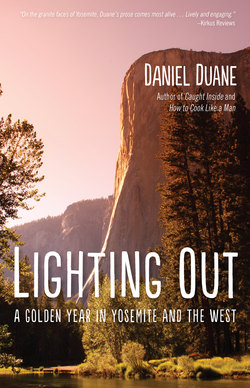Читать книгу Lighting Out - Daniel Duane - Страница 20
На сайте Литреса книга снята с продажи.
13
ОглавлениеOn the road back from Abbotts Lagoon, through the brambles and dense coastal forests around Inverness, I asked Kyla if she had to be back in town for any reason. Some journalist friends of my parents owned a farmhouse nearby, and they’d offered it to me more than once. She seemed happy to stretch out the trip, didn’t appear to want to go home anytime soon, so we made the drive a little farther north to the mouth of a small bay. A huge, rambling old white Victorian, the house was bordered on three sides by sheep range. Their caretaker, an old Marxist painter, lived out back in a chicken coop full of artifacts of the Revolution and Chinese miniature houses inhabited by dried, dressed-up cockroaches. When I knocked on his flimsy screen door I could see a paintbrush and sickle hanging over the stove. The bent, red-faced and charismatic old man recognized me from a family picnic and let us into the main house.
“Could you live like this?” Kyla asked, over a pot of tea in the big country kitchen. “In the country, I mean. Grow food, hang out?” I looked around at all the great copper pots hanging over the cooking range, at the early American furniture, the brick barbecue outside and the misty green hillsides; I imagined shacking up with Kyla in a place like this, opening a bed and breakfast, maybe trying to write a novel. I told her yeah, I thought so, but it would really help if there was a surf break or a climbing area nearby so I wouldn’t lose my mind. She rolled her eyes and started rubbing butter into flour for a pie crust. “I could do this forever,” she said. “Little garden out back? This is pretty much heaven to me.”
We cooked for hours—lentil dahl, tangerine chutney and a peach pie—but I had to drink the cabernet alone. Kyla wasn’t in the mood for red wine and it brought back my last college girlfriend again—she’d actually had a red wine fetish, something about all the implied late nights and worldly sadness, some ridiculous earthiness we’d affected together but wouldn’t own. Kyla’s triceps stood out in the soft kerosene light while she dried the dishes I’d just washed.
That night we slept in an attic room, and when I blew out the kerosene lantern the light from the Presbyterian church steeple spilled white across the bed. Kyla seemed to like being touched, and I stayed well within the implied non-aggression pact. Eventually I stopped moving my hand and settled back into the sheets. After a moment, she touched back, lightly, though she watched her hands on my skin as if watching a pigeon eat birdseed. Soon I fell asleep.
Fog pushed over hills on the sheep range where we walked the next morning and I listened as Kyla told me about more crummy relationships, some bastard boyfriend who’d dateraped her. We lay for a few hours next to an overturned car and watched sheep ambling around, lambs suckling. I took a good look at this woman I was following around, at the pleasure she took in exactly the places I’d been dying to come home to. She’d never left them and didn’t want to; she didn’t seem at all programmed with the lemminglike American impulse to flee home.
Back at the house, I started throwing a tennis ball for a lunatic border collie. The Episcopal service let out and families lingered by the side of the green, foggy sheep pastures to talk to the minister. The rancher who owned the dog walked over to introduce himself. He had huge forearms.
“I’d offer you my hand,” I said, “but it’s covered with dog spit.”
He laughed and smiled. He was a wiry man.
“I’ve had my hands up inside sheep all morning,” he said proudly, “didn’t have time to wash them. We’ve been lambing.”
Kyla mentioned how cute the lambs had been out in the fields, wandering around on their loose little legs. I agreed.
“Been a problem this year with the ravens,” the rancher explained, suddenly dour, “flying in when the ewe’s not looking and plucking the lamb’s anus and pulling their intestines out. The lambs are still alive when we get there and they just look up at you, wondering what to do. It’s awful.”
We stopped at the Calistoga Fair on the way back to Berkeley and Kyla spent an hour picking through rummage tables; a terrific haul, sheer booty—five wooden spoons and three wooden bowls, all for a song.
